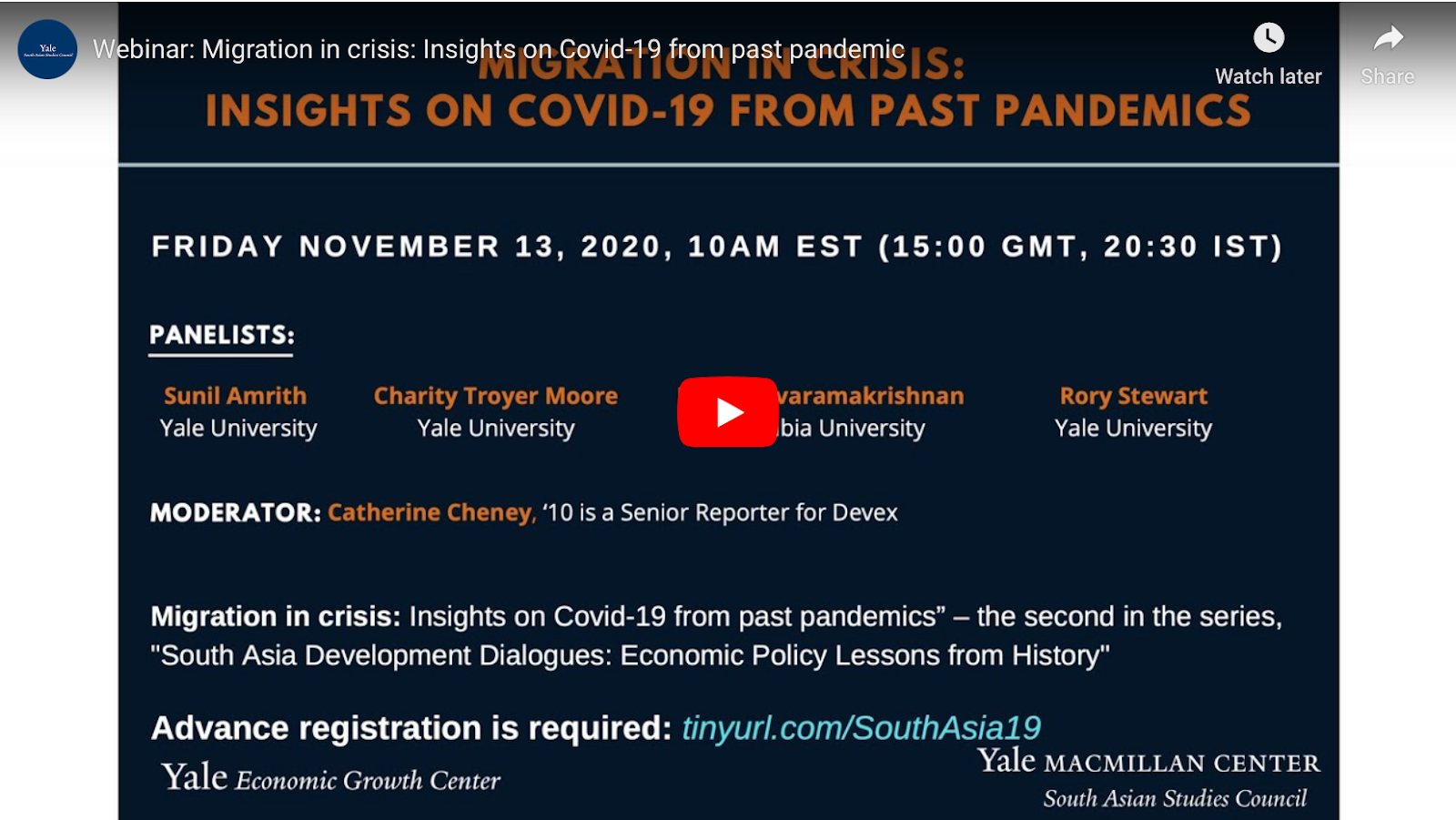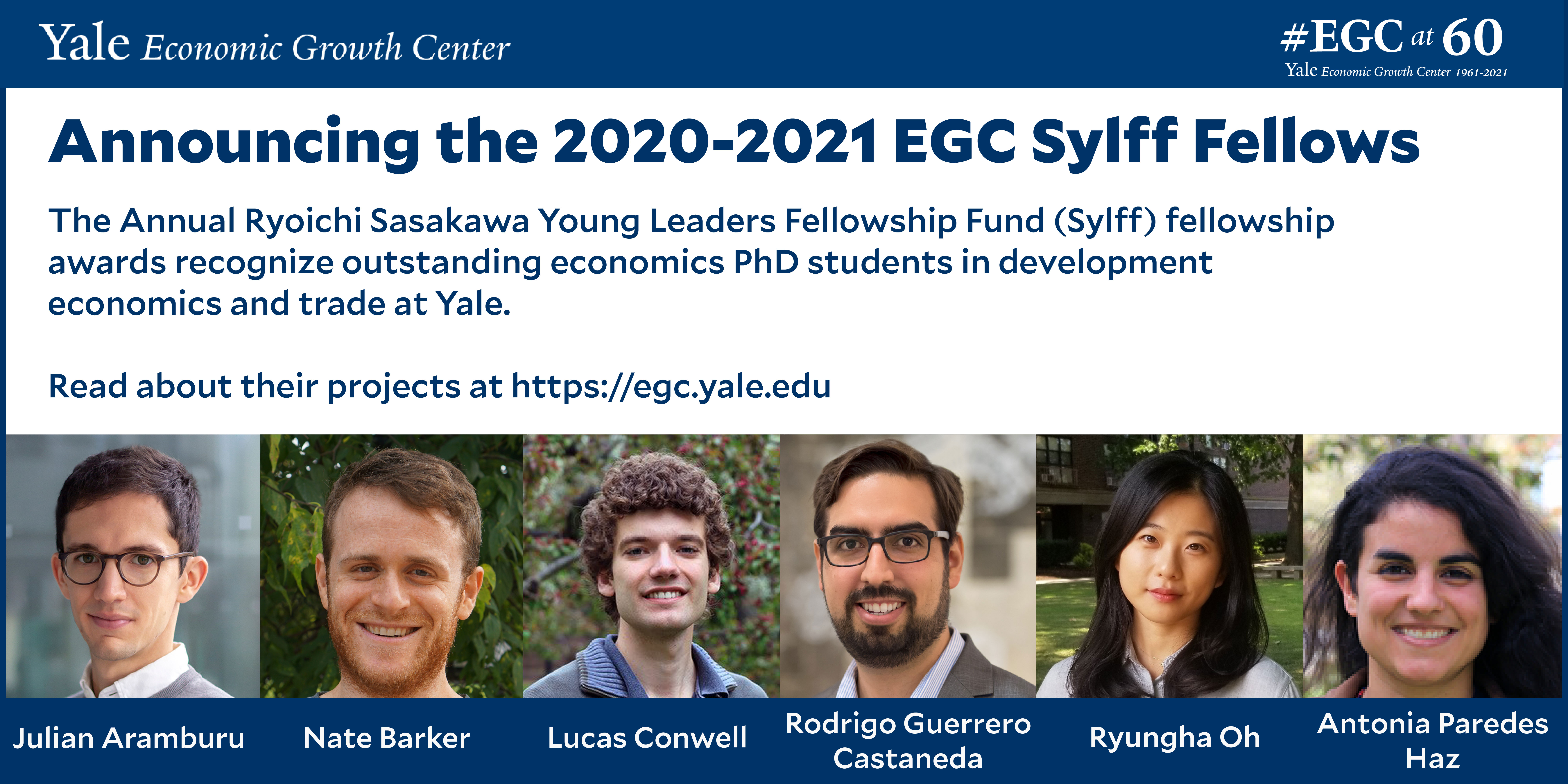EGC Quarterly Newsletter: February 2021
Looking back over a challenging year, and looking forward to our 60th Anniversary Celebration.

Beyond the Water's Edge: The value of internationalism in a time of shared crisis
The last year has been a challenge for all of us, but some have experienced an unequal share of the hardship.
The Covid-19 pandemic has exposed the inequality between countries, and the institutional poverty within them, and it has caused the first increase in global extreme poverty in the 21st century.
Embarking on EGC’s 60th anniversary year, 2021, in the midst of these turbulent times provides cause to reflect on the mission of the Center as it connects to all that’s happening in the world. In 1975, as part of its final appraisal of the grant that launched EGC, the Ford Foundation described its support of EGC as aligned with the mission to support “activities designed to advance the economic well-being of people everywhere” – a mandate that did not stop with domestic concerns in the United States but extended “beyond the water’s edge.”
Watch the recording here.
This tradition continues today. For example, the Center expanded its internship program to Yale students who had lost other summer work opportunities, putting them to work on data analysis for Covid-related projects in South Asia. In our development dialogue on November 13, historians and economists compared notes on how the health and economic effects of Covid-19, like past pandemics, have been dire for low-income workers with precarious job security – who cannot avail themselves of state support and cannot afford not to work – and those living in cramped, poor quality housing.
And our affiliates have been contributing to the global understanding of how the pandemic is affecting different groups. Women are more likely to be employed in the sectors most affected by long lockdowns, such as retail, restaurants and hotels, and have lost jobs at a faster rate than men. This is true in rich and poor countries alike. And, as we know from EGC affiliate Penny Goldberg’s work, women in lower-income countries who have kept their jobs will likely earn less, and hold jobs in the informal economy, which offers few protections.
Fabrizio Zilibotti and co-authors have described how school closures – which force many women to juggle their jobs and unpaid care work – also increase educational inequality. Gender-based violence is on the rise. And as schools reopen in low- and middle-income countries, girls are less present in the classroom.
Covid-19 has put in stark relief the vital importance of competent, evidence-based, forward-thinking governance and as Kevin Donovan’s research and John Eric Humphries’ EGC supported surveys highlighted, equally, the importance of social protection programs and small business support. Governments that listened to charlatans and privileged short-term economic gains over dealing effectively with the virus and providing adequate insurance are seeing overwhelming death and disease, and long-term economic harm. Countries that listened to scientists, prioritized public health, took care of the details of implementation, and successfully suppressed the virus have seen their economies rebound. In a recent op-ed, Mushfiq Mobarak describes how poor countries that acted on evidence from past outbreaks of disease outperformed many rich ones in limiting the virus’s spread.
Addressing the systemic inequities that the pandemic has laid bare will require ambitious, evidence-based, well-implemented policies, which focus on the long term, identify the vulnerable, recognize the economic and political forces that hold them back, and then restructure economic and political institutions for greater equality.
As researchers, at EGC, we will continue to go beyond the water’s edge to provide the evidence that governments need to use this crisis as an opportunity to redesign systems that truly work for all.

Rohini Pande
Henry J. Heinz II Professor of Economics
Director, Economic Growth Center
Looking forward: 2021 marks the 60th Anniversary of the Economic Growth Center.
We are marking #EGCat60 with:
- A series of articles about EGC’s history and contributions to development economics.
- Monthly EGC Affiliate Spotlight articles, starting with a profile of Sam Kortum and his recent work on carbon policy.
- Our series of Development Dialogues, which continues on Feb 9 with “Equitable Vaccine Distribution: Insights on Covid-19 from past public health emergencies”. Click here to receive registration details. The series is a collaboration with the South Asia Studies Council and the Jackson Institute.
- Virtual events which, in addition to Development Dialogues, includes a spring celebration of the International and Development Economics masters program, and a fall conference on economic and social justice. More to be announced soon.
You can keep abreast of our 60th Anniversary programming by selecting “Events” on our mailing list form, and by following #EGCat60 on social media.

Looking Back: 2020 saw researchers push forward despite challenges
EGC faculty published widely
- Kevin Donovan on how bridges in Nicaraguan villages bring economic benefits: read our summary.
- Penny Goldberg on how legal forms of gender discrimination around the world limit women’s opportunities: read our summary.
- Nicholas Ryan on how contract enforcement affected efficiency in procurement auctions for India’s largest power projects in India: read the paper.
- Explore the entire list of 2020 journal publications, and view our recent Research Summaries.
EGC continued to communicate its research and history
- YaleNews covered research by Orazio Attanasio and Costas Meghir, Penny Goldberg, and Rohini Pande.
- YaleNews covered EGC history, including profiles of women who helped found the Center, Nancy Ruggles and Miriam Chamberlain, and EGC’s influential Country Studies program of the 1960s.
- EGC researchers published op-eds in outlets including The New York Times, Project Syndicate, and Indian Express.
EGC events went online
- We hosted a virtual panel, Pioneering Women: Economic Growth Center and Yale Economics in September, honoring the women who helped found EGC in the 1960s.
- We launched the South Asia Development Dialogues: Economic Policy Lesson from History in October, bringing together historians, economists, and policymakers to bring a multidisciplinary perspective to today’s development challenges.
- Our weekly student lunches and development seminars continued online.
Read about the fellows and their research here.

